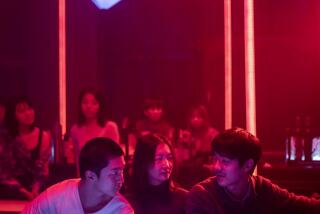‘What Women Want’ translates easily now
Filled with Frank Sinatra music, Chicago architecture and references to U.S. brands like Nike, the 2000 film “What Women Want” about a chauvinist ad exec who gains the ability to hear women’s thoughts is a “a very American movie,” director Nancy Meyers says on the commentary track of the DVD. “And the character is very American.”
A decade later, “What Women Want” has been remade in China and was released last month in the U.S. by upstart distributor China Lion. Meyers, for one, might be surprised to see how few details needed to be changed to make her story relevant to Chinese moviegoers.
Hong Kong singer-actor Andy Lau takes over the role originated by Mel Gibson, and just like Gibson he swills red wine and drinks coffee. Thanks to increasingly Westernized tastes in China, there was no need to substitute rice wine or tea, the filmmakers said. He drives an Acura, has a divorced wife who’s taken up with a foreigner, and serenades his work rival/love interest with an English-language song in a Beijing jazz lounge.
“It says a lot about how China has evolved,” said Dede Nickerson, an American and a producer on the new version who has lived in China for two decades and was key to setting up the remake of the Paramount Pictures film. “You would have had to make a lot more changes 10 years ago.”
The remake was directed by Chen Daming, who left China after the 1989 Tiananmen Square protests and spent most of the 1990s in Los Angeles, playing small roles in films like “Beverly Hills Ninja” and working on scripts. He returned to his homeland to take a stab at directing.
“China was changing economically, growing very fast, so I thought it was a very interesting time to do film,” he said. When Nickerson approached him about “What Women Want,” he was skeptical. But after a few conversations, he said, “I started to get excited about a story about what was going on with women in China.”
“Ten years ago, China was still a man-dominated society,” Chen said. “Men still had more power. It’s definitely changing. You look at all my friends — women are powerful and doing things much more than 10 years ago. There are many more opportunities.”
Chen said he did make certain changes to reflect Chinese mores, such as strengthening the family back story of the ad executive by adding a father character.
The new “What Women Want” also reflects how fast China has built up a globalized consumer culture after decades of centralized communist economic policies.
“When I was a student here in the late ‘80s, having a Coke and a bag of M&Ms was a luxury. Now I’m sitting here with a Starbucks,” said Nickerson. “In 1990, there were 50,000 cars in Beijing, and today there are 4 million.”
The filmmakers had no trouble attracting companies including Lipton Tea, Acura and L’Oreal to ink product-placement deals for the remake. Apple lent computers as props. “China is exactly like repeating America,” Chen said. “So I thought the film could be interesting in that way. The kind of lifestyle people try to have. You go to Beijing, and it has become a sea of McDonalds, other brands.”
Given how fast lifestyles in China and America are converging and that China’s homegrown film industry is still relatively immature compared to Hollywood’s, Nickerson and her fellow “What Women Want” producer Yu Dong say they see many opportunities to adapt U.S. productions.
“I extremely appreciate ‘Sleepless in Seattle,’” said Yu, “and I hope to make a Chinese movie out of it.”
More to Read
The biggest entertainment stories
Get our big stories about Hollywood, film, television, music, arts, culture and more right in your inbox as soon as they publish.
You may occasionally receive promotional content from the Los Angeles Times.







